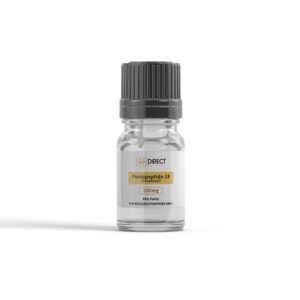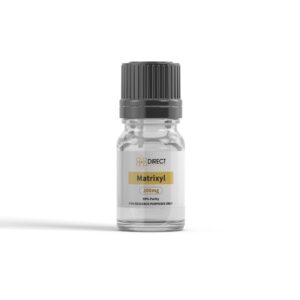Peptides have become a cornerstone in skin science research, especially when it comes to skin regeneration and anti-aging studies. Palmitoyl Tetrapeptide-7, also known as Rigin, is one such peptide that has garnered significant attention in recent years.
This synthetic peptide, composed of four amino acids, is primarily used in research and is not intended for human use outside of laboratory settings. But what makes Rigin so intriguing in the world of skincare research?
In this article, we’ll explore the benefits of Palmitoyl Tetrapeptide-7 based on current research findings. We’ll look at how it works, its potential benefits, and why it is often included in various skin-related studies.
Additionally, we will examine other peptides, such as Pentapeptide-18 and Matrixyl, which are commonly researched alongside Rigin for their complementary effects.
At its core, Palmitoyl Tetrapeptide-7 is designed to influence the skin’s cellular processes. It works by signaling various skin cells to perform specific tasks, such as promoting collagen production and reducing inflammation. These tasks are essential in maintaining skin health and combating the visible effects of aging, damage, or environmental stressors.
The action of Rigin in skin research is primarily focused on improving skin resilience and appearance by modulating the processes that affect inflammation and collagen synthesis. These factors are essential for healthy, youthful-looking skin, and their regulation is a central focus of many anti-aging studies..
Explore Palmitoyl Tetrapeptide-7 from Direct Peptides New Zealand to boost collagen and reduce skin inflammation for healthier, firmer skin.
One of the most discussed benefits of Palmitoyl Tetrapeptide-7 is its potential to reduce skin inflammation. Chronic inflammation is one of the primary contributors to skin aging, leading to issues such as fine lines, wrinkles, and skin sensitivity.
Research has indicated that Rigin may have a significant impact on reducing inflammatory markers in skin cells, which could, in turn, help to prevent premature skin aging. In studies involving Palmitoyl Tetrapeptide-7, it has been observed that the peptide works by modulating the inflammatory response in skin cells.
This anti-inflammatory effect makes Rigin a potential candidate for research into treating conditions where inflammation plays a central role, such as acne or dermatitis. Additionally, by reducing skin inflammation, Rigin may help preserve the skin’s youthful appearance, preventing the breakdown of key skin structures like collagen.
Explore Peptide Supplies at Direct Peptides New Zealand for all your reconstitution requirements.
Collagen is the key structural protein in the skin, responsible for maintaining its firmness and elasticity. As we age, collagen production slows down, leading to the formation of wrinkles and sagging skin. Palmitoyl Tetrapeptide-7 has shown promise in stimulating collagen production within the dermis, the skin’s thick inner layer.
Research into Rigin has shown that it can enhance the activity of fibroblasts—the cells responsible for producing collagen and other extracellular matrix components.
By boosting collagen synthesis, Rigin may help improve the structural integrity of the skin, providing a firmer and smoother appearance. This potential for collagen stimulation is a reason why Palmitoyl Tetrapeptide-7 is a focal point in many anti-aging studies.
Elasticity is another critical factor in maintaining youthful skin. Over time, the skin’s ability to stretch and return to its original shape diminishes, contributing to sagging and wrinkles. Palmitoyl Tetrapeptide-7 may help improve skin elasticity by supporting the production of elastin fibers, which are integral to skin’s stretchability.
While collagen maintains the skin’s firmness, elastin provides the bounce and resilience. The combination of increased collagen production and enhanced elastin synthesis could make Rigin an essential research peptide for combating the loss of skin elasticity. By incorporating Palmitoyl Tetrapeptide-7 into research studies, scientists hope to explore its potential for reducing sagging and improving overall skin texture.
In many research studies, Palmitoyl Tetrapeptide-7 is used alongside other peptides to enhance its effects. Two peptides that are commonly paired with Rigin are Pentapeptide-18 and Matrixyl. These peptides have their own specific functions but work synergistically with Rigin to amplify the benefits.
 Pentapeptide-18 is a peptide known for its ability to reduce the appearance of expression lines. These lines, often caused by repeated facial expressions such as frowning or smiling, can become more prominent as the skin ages. Pentapeptide-18 works by inhibiting the contraction of facial muscles, thus preventing the formation of these wrinkles.
Pentapeptide-18 is a peptide known for its ability to reduce the appearance of expression lines. These lines, often caused by repeated facial expressions such as frowning or smiling, can become more prominent as the skin ages. Pentapeptide-18 works by inhibiting the contraction of facial muscles, thus preventing the formation of these wrinkles.
In research involving Palmitoyl Tetrapeptide-7, combining it with Pentapeptide-18 could lead to even better results in addressing expression lines and skin aging.
The combined effect of both peptides could be significant, with Rigin reducing inflammation and stimulating collagen, while Pentapeptide-18 works on minimizing expression lines at the muscle level.
Explore Pentapeptide-18 from Direct Peptides New Zealand, a peptide that helps smooth expression lines by relaxing facial muscles.
 Matrixyl (also known as Palmitoyl Pentapeptide-4) is another peptide that has shown great promise in anti-aging research. It stimulates collagen production and has been shown to improve the skin’s texture by reducing fine lines and wrinkles. Matrixyl has a unique ability to enhance the skin’s regenerative processes, making it a key peptide in studies related to skin rejuvenation.
Matrixyl (also known as Palmitoyl Pentapeptide-4) is another peptide that has shown great promise in anti-aging research. It stimulates collagen production and has been shown to improve the skin’s texture by reducing fine lines and wrinkles. Matrixyl has a unique ability to enhance the skin’s regenerative processes, making it a key peptide in studies related to skin rejuvenation.
When combined with Rigin, Matrixyl helps to reinforce the skin’s structural integrity and promote smoother, younger-looking skin. The synergistic effect of these two peptides could provide a comprehensive solution for addressing multiple signs of skin aging.
Discover Matrixyl from Direct Peptides New Zealand, a powerful peptide that stimulates collagen and reduces fine lines and wrinkles.
In addition to its core benefits—reducing inflammation, supporting collagen production, and improving elasticity—Palmitoyl Tetrapeptide-7 offers other potential advantages in skin research.
The research into peptides like Palmitoyl Tetrapeptide-7 continues to evolve. As scientists refine their understanding of how peptides influence skin at the molecular level, new and more effective peptide-based formulations are likely to emerge.
The combined use of Rigin, Pentapeptide-18, Matrixyl, and other peptides in research could provide insights into new ways of preventing and treating signs of aging.
Palmitoyl Tetrapeptide-7 (Rigin) holds great promise as a research tool for improving skin health and tackling the visible effects of aging. Its ability to reduce inflammation, stimulate collagen production, and improve skin elasticity makes it a valuable addition to the peptide research community.
While Rigin is primarily used for research and not for direct consumer use, the findings from these studies are critical in understanding how peptides can benefit skin over the long term.
As the science behind peptides like Palmitoyl Tetrapeptide-7 evolves, we can expect to see even more innovations in skincare products and treatments. For now, though, Rigin continues to be an exciting subject of study in the quest for better, more effective skin rejuvenation.
Refrences
[1] Resende DISP, Ferreira MS, Sousa-Lobo JM, Sousa E, Almeida IF. Usage of Synthetic Peptides in Cosmetics for Sensitive Skin. Pharmaceuticals (Basel). 2021 Jul 21;14(8):702.
[2] Fadilah NIM, Rahman MBA, Yusof LM, Mustapha NM, Ahmad H. The Therapeutic Effect and In Vivo Assessment of Palmitoyl-GDPH on the Wound Healing Process. Pharmaceutics. 2021 Feb 1;13(2):193.
[3] Pintea A, Manea A, Pintea C, Vlad RA, Bîrsan M, Antonoaea P, Rédai EM, Ciurba A. Peptides: Emerging Candidates for the Prevention and Treatment of Skin Senescence: A Review. Biomolecules. 2025 Jan 9;15(1):88.
[4] Pawłowska M, Marzec M, Jankowiak W, Nowak I. Solid Lipid Nanoparticles Incorporated with Retinol and Pentapeptide-18-Optimization, Characterization, and Cosmetic Application. Int J Mol Sci. 2024 Sep 19;25(18):10078.
[5] Kachooeian M, Mousivand Z, Sharifikolouei E, Shirangi M, Firoozpour L, Raoufi M, Sharifzadeh M. Matrixyl Patch vs Matrixyl Cream: A Comparative In Vivo Investigation of Matrixyl (MTI) Effect on Wound Healing. ACS Omega. 2022 Jul 11;7(28):24695-24704.
Shop ALL Topical Peptides from Direct Peptides New Zealand today, your trusted supplier of premium clinical grade peptides online.
Palmitoyl Tetrapeptide-7 targets cellular signaling pathways linked to inflammation and matrix balance. It acts on cytokine signaling and fibroblast communication within skin tissue models. By influencing these pathways, the peptide helps regulate processes that affect collagen stability, elastin structure, and overall cellular stress response in skin research.
Palmitoyl Tetrapeptide-7 is considered an anti-aging peptide because it addresses key biological drivers of skin aging. Research shows it helps reduce inflammatory signaling and supports fibroblast activity. These actions help maintain collagen structure, skin elasticity, and tissue integrity, which are commonly studied markers in skin aging research models.
Palmitoyl Tetrapeptide-7 differs from Matrixyl by focusing on controlling inflammation rather than directly stimulating collagen. Matrixyl primarily signals fibroblasts to increase collagen and matrix production. Palmitoyl Tetrapeptide-7 supports matrix stability by reducing inflammatory stress, which is why research often examines both peptides together to examine broader skin-aging pathways.
Palmitoyl Tetrapeptide-7 supports fibroblast signaling involved in the maintenance of collagen and elastin. Research models show the peptide helps create conditions that favor normal fibroblast function. This activity promotes extracellular matrix balance and makes the valuable peptide in studies focused on skin firmness, repair, and age related structural changes.
Palmitoyl Tetrapeptide-7 does not directly block collagen degrading enzymes. Research suggests it may help limit collagen breakdown indirectly by reducing inflammatory signaling linked to matrix degradation. By lowering inflammatory stress within skin tissue models, the peptide supports collagen stability and overall extracellular matrix preservation in research settings.
ALL CONTENT AND PRODUCT INFORMATION AVAILABLE ON THIS WEBSITE IS FOR EDUCATIONAL PURPOSES ONLY.
DISCLAIMER: These products are intended solely as a research chemical only. This classification allows for their use only for research development and laboratory studies. The information available on our New Zealand Direct Peptides website: https://direct-peptides.com is provided for educational purposes only. These products are not for human or animal use or consumption in any manner. Handling of these products should be limited to suitably qualified professionals. They are not to be classified as a drug, food, cosmetic, or medicinal product and must not be mislabelled or used as such.